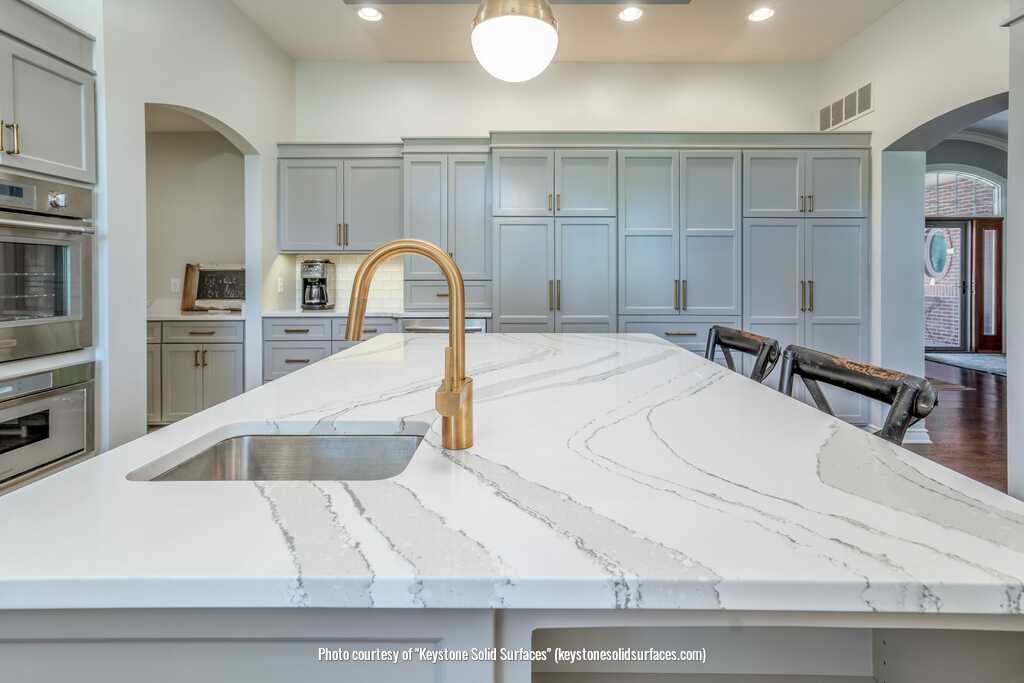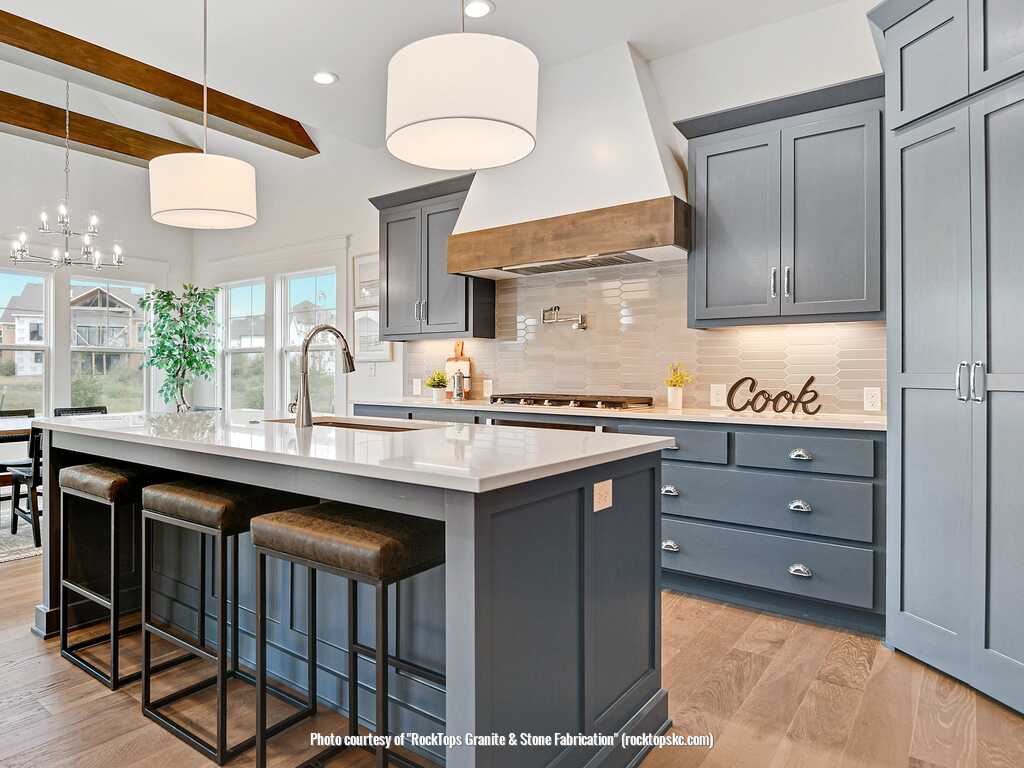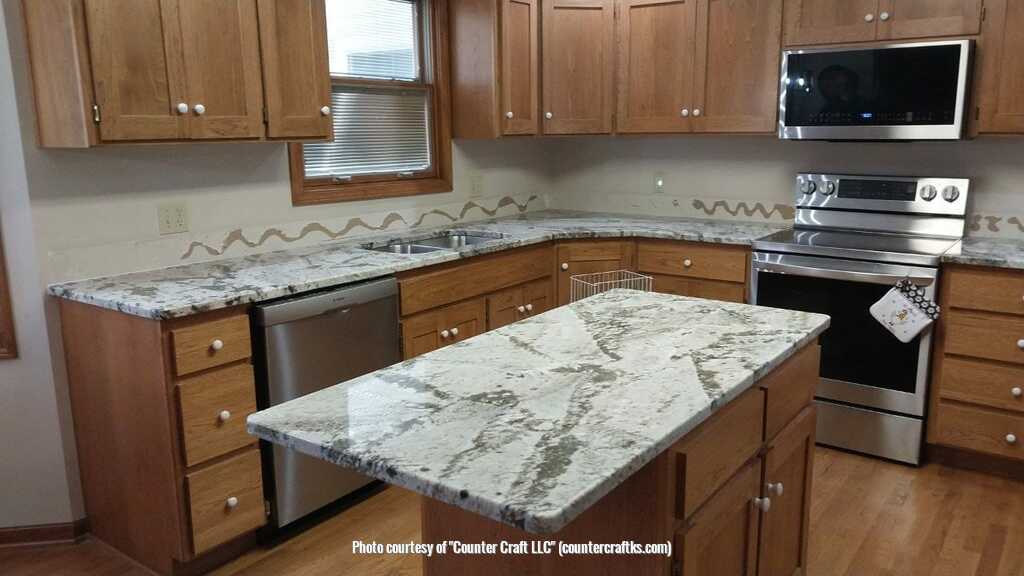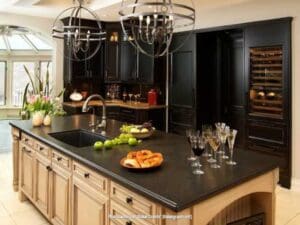Imagine walking into your kitchen, where the heart of your home beats. You are greeted by the timeless elegance and cool touch of marble countertops. This isn't just any kitchen. It's a statement of luxury and a testament to your taste.
Marble countertops are really popular with American homeowners, even though they're expensive and need a lot of care.
Let's find out why by diving deep into marble countertops pros and cons.
What lies beneath the surface of these stunningly beautiful counters?
Key Takeaways:
- Luxurious Appeal. Marble is a premier countertop material. It brings a touch of sophistication and timeless beauty to any kitchen. Marble countertops make your kitchen look really classy and stylish. As one of the most sought-after natural stones, marble stands out for its distinct elegance.
- Unique Design. Each marble slab is unique. So your kitchen will have its own special look.
- Visual and Functional Benefits. Marble is cool to the touch. The cool surface of marble makes it an ideal kitchen countertop material for those who love baking and cooking. Thus, this stone combines aesthetics and functionality.
- Investment Requirement. Marble is not cheap. You'll need to make a significant financial investment.
- Maintenance and Care. Marble is prone to stains and scratches. It requires diligent care and a commitment to ongoing maintenance.
- Additional Value of Your Home. Marble countertops make your home more attractive and increase its value.
- Importance of Proper Maintenance. To keep marble countertops looking great for a long time, you need to know how to take care of them properly.
Marble Countertop Pros
Adding marble countertops to your kitchen can really make it better. They bring a timeless beauty and are also good for baking, thanks to their cool surface. So, they offer both style and practical benefits.
Marble is Gorgeous and Offers a Unique Look
Each slab of marble is truly unique . It has special patterns and veins that make it stand out. With its intrinsic beauty, a marble countertop is not just a surface. It's a centerpiece in your kitchen. Options like Carrara and Calacatta marble provide a variety of looks. Pick the one that matches your home's style perfectly.
Perfect for Bakers
Marble’s naturally cool temperature makes it a great choice for bakers. This is an ideal surface for rolling out pastry dough. It's also tough against heat. It means you can place hot pots and pans on the surface without worrying about damage. However, it's better to use hot pads or trivets to make your marble kitchen countertop serve longer.
Marble Has Maintained its Value Better than Granite
Over time, your investment in marble could pay off since it often maintains its value better than granite. Homeowners and real estate agents alike view marble as a marker of quality and luxury. It can be a significant advantage if you ever decide to sell your home.
Marble Countertops Fit a Variety of Homes
No matter if your home is cozy and rustic, sleek and modern, or somewhere in between, marble works with any look. Marble's versatility allows it to fit seamlessly into various design styles. An interior designer would tell you that marble easily adapts to your lifestyle and personal aesthetic.
Increased Home Value
Marble countertops are often seen as a sign of luxury and can contribute to an increased home value. Adding marble to your kitchen can be a strategic move that impacts the overall real estate value of your property.
Eco-Friendly
Choosing marble is good for the planet because it's one of the natural materials that don't need extra resources to make. If you get marble from local sources, you're also cutting down on transportation. It helps reduce your environmental impact.

Marble Countertop Cons
Marble countertops add elegance to your kitchen. However, they come with several downsides that you should consider. These disadvantages relate to maintenance, durability, and cost.
White Marble Countertops Need Constant Sealing
White marble countertops can easily get stained because of their light coloring. To protect them from absorbing liquids and developing stains, constant sealing is a necessary routine. This involves initial sealing post-installation and periodic resealing to maintain its protective layer.
Marble Gets Weaker with Time
Even though marble is a strong material, it can start to wear down over time. It can develop cracks, especially if it frequently comes into contact with heavy objects. This means that your countertop's durability is compromised and will start to show signs of aging as the years go by.
Soft and Porous
The luxurious feel of marble comes at a cost—it's a soft and porous stone. It makes it more prone to scratches and stains than other materials. You'll need to be cautious about what you place on your countertops and ensure you clean up any spills immediately.
Potential Etching
Acidic substances like lemon juice or vinegar can cause etching on marble countertops. This isn't a stain but rather a dull spot that occurs when acids corrode the surface. Regular maintenance, including careful cleaning and polishing, can reduce etching. However, you might need professional help for severe cases.
Marble Countertops are More Expensive than Other Countertop Options
If you're working within a budget, you should know marble countertops are on the more expensive end of the spectrum. The initial cost plus the ongoing investment in maintenance can add up. It makes marble a significant financial commitment.
Must Be Resealed
To keep your marble countertop protected and looking its best, resealing is a non-negotiable part of care. This process isn't just a one-time event. It's a maintenance task that you'll have to schedule regularly to keep up the stone's resistance to damage.
Marble Countertop Cost
When considering marble countertops for your kitchen or bathroom, the price is a big deal. The price can vary widely. It is defined by factors like the type of marble, the complexity of your installation, and the region you live in.
Cost of White Marble Countertops
White marble is highly sought after for its pristine beauty and classic look. On average, the cost for white marble countertops ranges from $50 to $250 per square foot. It usually includes installation charges. It's important to note that the rarity of the marble variety can affect the price significantly. The more exotic and less available, the higher the cost can be.
- Carrara Marble. Often on the more affordable end, you might expect to pay on the lower side of the range for this elegant, gray-veined white marble.
- Calacatta Marble. Known for its distinctive look and greater rarity, Calacatta tends to fall on the higher end of the cost spectrum.
Remember, installation costs can also influence your budget. Here are some factors that contribute to installation costs.
- The complexity of your layout.
- The need for stronger supports because marble is heavy.
- The inclusion of custom edges or finishes.
As a homeowner, it's wise to get multiple quotes to find a balance between quality and expense. Even the most beautiful marble isn't worth stretching your budget too thin. Keep in mind this. While upfront costs are a consideration, the long-term value and enjoyment of your white marble countertops are worth it.
Are Marble Countertops Worth the Price and Effort?
If you want to install marble countertops, your primary concerns may revolve around their cost and maintenance. Marble is a premium material, associated with luxury and timeless beauty, which can enhance the value of your home. However, the investment is significant, and maintaining that luxurious look requires consistent effort.
Cost
Marble varies in price. It is generally on the higher end of countertop materials. The cost depends on the marble type, thickness, and finish. Custom cuts and installations will also add to the overall expense.
Maintenance
Your marble countertops will demand regular care. Sealing them once or twice a year is recommended to prevent staining. Daily cleaning with gentle soap and water is essential, but avoid acidic cleaners that can etch the surface.
Pros
- Aesthetic Appeal. Each slab is unique, adding an element of luxury.
- Heat Resistance. Great for hot pots and pans in the kitchen.
Cons
- Scratching. Marble can scratch easier than harder stones.
- Staining. Lighter marble is prone to stains if not sealed properly.
Are marble countertops worth it? It comes down to comparing their good looks and lasting value with the upfront cost and the work needed to keep them up. If you adore the look and are prepared for the care they require, marble can be a rewarding choice.
Why People Prefer Quartz Countertops
When you're considering a kitchen update, quartz countertops are often a leading choice. They combine durability with a range of aesthetic options.
Low Maintenance of Quartz Countertops
Quartz countertops are renowned for their low maintenance. Unlike natural stone, quartz is non-porous, meaning it doesn't require sealing. You won't have to worry about stains setting in because quartz is stain-resistant. Daily cleanup is simple; just wipe down with a cloth and mild detergent.
Additionally, these countertops are scratch-resistant. This is essential for preserving the countertop’s beauty over time. The durability of quartz combined with its low maintenance needs explains why it's such a popular choice for busy kitchens.
Marble Countertop Maintenance and Care Tips
Marble countertops are a stunning addition to any kitchen or bathroom, but they do require a bit of extra attention to keep them looking their best. It's worth noting that marble is a bit high maintenance compared to granite countertops.
However, with regular care, your marble counters can remain a centrepiece of beauty in your home.
Daily Cleaning
- Use a soft, non-abrasive cloth or sponge.
- Clean with warm water and, if needed, a drop of mild dish soap.
- Always rinse thoroughly to avoid soap residue.
- Dry with a separate cloth to prevent water spots.
Weekly Maintenance
- For deeper cleaning, consider a product specifically designed for marble.
- Apply marble polish to enhance your countertop's shine as needed, but do so sparingly to avoid buildup.
Periodic Sealing
- Apply a sealant regularly, ranging from every 3-6 months to a year, depending on the marble's usage and exposure.
Preventive Guidelines
- Always use coasters under glasses, especially those containing alcohol or citrus juices.
- Quickly clean up any spills, particularly acidic liquids.
- Avoid placing hot items directly on the marble surface.
Remember, your marble countertops are not just a functional surface but also an investment. By following these care and maintenance tips, you can enjoy their natural elegance for years to come.

Marble Countertop Design Options
When choosing your marble countertop, you have lots of styles to pick from. Each option brings its own aesthetic and functional qualities to your space.
Colors: Marble countertops offer a variety of color options, from the classic whites and grays to more exotic hues such as deep greens or blues. Your choice of color can significantly influence the ambiance of your kitchen or bathroom.
Finishes:
- Polished. This finish gives your marble a high-gloss, reflective surface, enhancing the stone’s natural colors and veining.
- Honed. For a more matte appearance, honed finishes provide a flat, smooth surface that diffuses light, giving a more subtle look.
- Brushed. If you're looking for a worn-in texture with a little more character, consider a brushed finish. It provides a slightly rougher, more tactile surface than honed.
- Textured. Those who favor a rustic aesthetic might opt for more textured finishes, which can add depth to the marble’s appearance.
Shapes and Sizes:
- Tiles. Marble tiles can be a cost-effective and versatile option. They allow for creative patterns and designs in smaller spaces.
- Slabs. Large marble slabs can create stunning, seamless countertops with continuous color and pattern.
Keep in mind that each finish and color may require different care to maintain its beauty. Polished surfaces, for example, can show scratches more readily but are often easier to clean. A honed finish might not show etching as prominently, but can be more susceptible to staining.
You're encouraged to touch and feel the samples in-person, as marble's texture plays a huge role in its overall effect on your space. Your choice of marble can truly personalize your home, adding both elegance and value.
Marble Countertop Installation
Now you know all the marble countertops pros and cons and may want to go for this option.
Installing a marble countertop can elevate the elegance of your kitchen or bathroom. However, there are several essential steps you should be aware of before diving into the process.
Fabrication
The fabrication process begins after you have selected your preferred marble slab. It involves cutting the stone to fit your space precisely, creating edges, and making cutouts for sinks and fixtures. Professional fabricators can do this for you. They ensure the marble fits perfectly and matches your expectations.
Working with an Interior Designer
Consulting an interior designer can be beneficial in making critical decisions. They help you decide on marble type, color, and finish to complement your space's interior design. Their expertise helps you blend the marble's natural beauty with the rest of your décor.
Installation
The actual installation involves transporting the heavy slabs and securing them in place. This process usually requires a team of experienced installers to handle the stone with care to avoid any damage. It's important to clear the area to make space for the work to be done efficiently.
Installation Costs
The costs associated with marble countertop installation can vary based on several factors:
- Size of your countertops
- Complexity of the installation
- Geographic location
Here's a simple breakdown of potential costs:
| Installation Phase |
Cost Range |
| Measurement |
Included or up to $200 |
| Fabrication |
$10 - $35 per square foot |
| Installation |
$40 - $100 per square foot |
Note that these are estimates, and prices may vary depending on specifics.
Sealant Application
After installation, your countertops will need to be sealed to protect against stains. This is especially important for marble due to its porous nature. Regular resealing is recommended to maintain its resistance to stains and etching.
Marble Countertop Lifespan
When you're considering marble for your kitchen or bathroom, it's natural to wonder about its longevity. As a natural stone countertop, marble has a long lifespan that, with proper care, can span several decades.
Durability
Marble is a durable material. However, it's also somewhat soft compared to some other stones. It means it can be prone to scratching or chipping. If you take care of it properly, it can last for years. Its enduring quality is evident as some marble structures have lasted for centuries.
Maintenance and Patina
Here's the thing. Your maintenance routine will play a significant role in the longevity of your marble countertop. Seal it regularly. It can help protect against stains and etching. Over time, marble develops a patina. This is a surface change that can add character to the stone.
Regular Upkeep
- Clean spills promptly.
- Use coasters and trivets.
- Avoid abrasive cleaners.
- Reapply sealant as needed.
With attentive upkeep, marble can please your eyes for many years.

Top Marble Countertop Brands
When you're in the market for that perfect marble countertop, knowing the top brands that cater to quality and style is essential. Here are some leading names you should be aware of:
- Carrara Marble. This brand is synonymous with high-quality marble. Carrara marble is loved for its affordability and availability, making it a preferred choice for many homeowners. Its classic blue-gray veining offers a sophisticated look to any kitchen or bathroom.
- Calacatta Marble. If you're seeking something truly unique, Calacatta marble is a great option. It's known for its distinct bold veining. This marble is less common and therefore often considered more luxurious than Carrara. It's an exquisite choice for a statement countertop.
- Branded Countertops. Besides natural marbles like Carrara and Calacatta, various companies offer branded countertop options. These brands often provide engineered marble countertops. They come with a uniform appearance and sometimes improved durability. Statuario marble, with its striking white background and bold veins, is another example of an expensive marble. It adds dramatic beauty to any space.
Here's a quick table to help you compare these options:
| Brand/Type |
Characteristics |
Availabilty |
| Carrara Marble |
More uniform, subtle veining |
Readlly available |
| Calacatta Marble |
Bold veining, luxurious |
Less common |
| Branded Countertops |
Engineered options, uniform quality |
Depends on brand |
Weigh aesthetic preferences and practical aspects like maintenance and durability.
Carrara and Calacatta are both excellent choices for bringing elegance to your space. Branded countertops offer more uniformity in appearance and might come with additional features. It all boils down to what fits your style and needs the best.
Where to Order Marble Countertops Near Me
Finding the perfect marble countertop for your kitchen or bathroom is easier than you might think.
Step-by-Step Guide
- Start by visiting countertopscontractors.com, a user-friendly website where you can quickly find skilled countertop experts.
- Location. Simply input your city or state to tailor the search to your area.
- Material Selection. Make sure to select 'marble' as your preferred material to focus your search on experts who specialize in marble countertops.
- Specify the Room. Indicate whether the marble countertop is for your kitchen, bathroom, or another area in your home to get the most relevant options.
- Results. After entering your requirements, the site will provide a list of top-rated local contractors.
Tips
- Research. Check out portfolios and reviews to ensure quality.
- Quotes. Don’t hesitate to request quotes from multiple contractors to compare prices and services.
Remember. With the right steps, you're sure to discover the ideal marble countertop option that complements your home’s style.
Frequently Asked Questions
How much do white marble countertops cost?
The cost of white marble countertops can vary widely, depending on the marble type and where you purchase from. Typically, prices can range from $40 to $200 per square foot. Factors like thickness, finishing, and the complexity of the installation can influence your total cost.
What is the downside of marble countertops?
Among the cons of marble countertops are their porosity, which makes them prone to stains and etching. Acidic substances can leave a dull mark if not wiped immediately. Plus, marble can easily scratch, and repairs can be difficult.
Are marble countertops hard to maintain?
Marble countertops can be considered high maintenance due to their need for regular sealing to prevent stains. Wiping spills quickly and using cutting boards can help avoid scratches and etches. Regular care is crucial to maintain their pristine appearance.
Why is it recommended that marble countertops not be used in kitchens?
It's often advised to avoid marble in kitchens because the high activity can expose the material to more stains, etching, and scratches. If you love the look of marble, be prepared for the extra maintenance and diligence required in a kitchen setting.
Is marble better than granite?
Whether marble is better than granite for your kitchen countertops depends on your budget, lifestyle, and preference for appearance versus durability. On one hand, marble offers unrivaled elegance. On the other hand, granite is known for its resistance to stains, scratches, and less frequent resealing needs.
Are marble countertops high maintenance?
Indeed, marble countertops require careful maintenance. You'll need to commit to regular cleaning. And don't forget about resealing every six to twelve months. On top of that, it will require immediate attention to spills to prevent permanent damage. Your patience and effort are essential to keep them in top condition.













